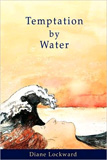October 10, 2010TEMPTATION BY WATER
Review by Barbara Daniels
Wind Publications
600 Overbrook Drive
Nicholasville KY 40356
IBSN 978-1-936138-12-8
2010, 93 pp., $15.00
http://windpub.com
Temptation by Water, Diane Lockward’s fourth volume of poetry, is both fierce and funny. This lively new collection piercingly depicts loss but balances it with wit and genial good humor. Some of Lockward’s poems confront difficult but necessary truths but others are sexy, irreverent and amusing. Despite the heart-wrenching loss of a husband or lover, the poet never feels sorry for herself. Her poems are a pleasure to read, and her talent for the unexpected keeps readers turning the pages.
One of the satisfactions of this collection is its control of craft. Lockward is a master of the apt metaphor, such as “the blood-soaked butcher paper / flapping in the street,” an emblem of lost love in “There Where Love Had Been.” Her surprising line breaks add extra dimensions of meaning, and rhyme and near rhyme add lovely, subtle music. The poems’ wording is often both surprising and exactly right, as in “the razzle / of light on water” in the title poem, “Temptation by Water,” an ekphrastic work based on Henri Matisse’s The Open Window. Lockward uses evocative, multilayered language but is not afraid to make sense; readers always know where they are.
The book’s epigraph claims that “our real desire is to be tempted enough” (Augustus William Hare). But how much is too much? There are many temptations in these pages, including a too-expensive sexy red dress and disturbing, desirable men, one of whom is so dangerous he comes with a warning label: “all trans fats and palm oil,” “a four-hour erection,” “the Mickey Finn of obsessions” (“Side Effects”). Food is another temptation. Seductive and amusing food fills the pages of this volume: soup for “the man who has lost everything” (“No soup for you!”), irresistible Autumnglo and Elegant Lady peaches, aromatic lychee, a potato chip containing the image of Jesus, and a filbert, a runty nut so disdained that Lockward imagines it plotting a Carrie-like revenge on its enemies. Some of the poems, such as “If Only Humpty Dumpty Had Been a Cookie,” are pure fun, but even here a shadow falls over the women who bake for Humpty Dumpty, “filling and enfolding him, / bringing him home, wrapped / in the unbreakable dough of their arms.”
Much has been lost and broken in the world of these poems, including a family that cannot be mended despite a repair crew that comes in to sew a woman’s mouth shut and teach her son how to shoot, and most tellingly, the spouse or lover who leaves despite prayers for a miracle. Lockward forces readers to look when they might not want to—at terrifying dreams, poisoned starlings plummeting from the sky, and the rosy anus of a beloved infant, “the lilliputian donut hole, / the dark star puckered like a kiss” (“It Runs This Deep”). She gazes unblinkingly at the bleeding leg of a young raccoon, young neighbors passionately tangled in each other’s arms, and dying butterflies captured for a science project. If a kill jar and a pin through the thorax of a butterfly are necessary, so be it, Lockward implies.
Facing complexities and contradictions forces the poet to gain hard-won self-knowledge. “I don’t trust my heart these days, too often / a foul cistern breeding toads,” she acknowledges (“Capturing the Image”). She wants the ocean to wash her clean, yet she also yearns for its opposite: “Cover me in filth,” she asks in “My Dark Lord.” She has been exposed, stripped like a lemon or an ecdysiast and longing for escape. In “When Pigs Flee,” piglets are sensualists who “want what’s outside— / quail and turkey eggs, / the woodsy flavor of porcinis.” Most of all, they want to get away, “Their unfettered feet forever unpickled.”
Temptation by Water depicts some ways to escape, but nothing comes easily in these poems. Lockward skillfully portrays the forced lightheartedness of a happy hour drinker who proclaims: “Here’s to the gin mills / of America, the taverns, bars, pubs, / road stops, cafés, saloons, and the shot / and beer joints. . . . Let the engines idle / the dark roads remain untraveled” (“Happy Hour”). Nature provides some consolation:
There where a heart
has bled,
I breathe the duff
of deciduous leaves,
leave my sorrows
among moss and mushrooms
(“Bathing in Forest Dusk”)
But what the poet turns to may necessarily be bitter. “What I want is the desert,” she confesses (“The Temptation of Mirage”). In “Nostrum” she advises facing loss directly by telling a medicine man “what you mourn— / the house you lost, the man you loved, the child torn / in pieces. Add it up, calculate the sum / of your grief. Drink the pulp and skin, the fermented must”—the harsh leftovers after wine has been made. “Must” appears again in “The Very Smell of Him,” in which it is the thistle and cinnamon scented must of the lost man that the poet longs for.
The best revenge on a husband who may deserve living in the doghouse (as happens in the amusing “Leaving in Pieces” in which a bald husband trades places with a dog) is to fall hard for someone else. “Love Song with Plum” is a giddy celebration of sensuousness and new love. Readers know the new directions the poet’s life is taking are not easy, but her humor and zest for life make this poem—and this book—a delight.